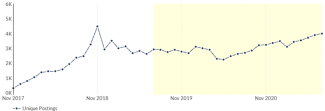
September 20, 2022
SCARP is proud to finally announce the upcoming launch of a new BA Major in Urban Studies
co‑managed and co-taught with the Faculty of Arts’ Department of Geography!
After a robust proposal and approvals process, the Ministry has approved the undergraduate program as proposed. With elation and excitement, we can now confirm SCARP and UBC Geography will begin teaching our first cohort of students in the 2023/2024 academic year!
Created partly in the wake of overwhelming student demand, the Bachelor in Urban Studies (which many are already colloquially referring to as “The BUS”) represents a new partnership between SCARP and Geography, which enables both to offer a more robust integration of conceptual and applied training than either could accomplish alone. At the forefront of this partnership is:
This new program is only possible because of the dynamism, vision, and leadership of our colleagues in the School of Community and Regional Planning, along with partnerships across the Faculty of Arts and the Faculty of Applied Sciences. We are grateful for the opportunity to work with them to inspire the next generation of city-makers!
In a dynamic, diverse urban world where we all have our differences, we all share universal challenges and opportunities of understanding and planning cities of opportunity, equity, sustainability, and reconciliation.
Professor Elvin Wyly
The importance of Urban Studies
Urban Studies is an interdisciplinary field that furthers understanding of the forces that shape cities and how to redirect those forces.
Cities are at the forefront of climate action, and urban policy is seen by global and local governments as a catalyst for transition to a sustainable and just society. Now, more than ever, we need people who are deeply trained to understand and shape urbanization from the public, private, and civic sectors.
In British Columbia and elsewhere, the challenges created by events like the current global health pandemic and recent climate-related “heat domes”, as well as pressing demands like the need to implement Indigenous human rights are reshaping people’s views on cities, generating a high demand for such professionals.
To say Urban Studies is an interdisciplinary pursuit is an understatement. It has been a crucial cornerstone of UBC scholarly academic pursuit, and a central topic to scholars across numerous fields. This program, as it’s been designed, is an excellent container for transdisciplinary innovation, and the training ground for people who understand how the disparate parts of a city fit together.
This represents a happy opportunity for UBC students, many of whom when polled expressed strong support for a major in Urban Studies. In addition, the program represents an opportunity to strengthen UBC’s reputation as a leading center of urban education and research and expand its ability to fulfill its strategic goals. Organizers of this Bachelor’s describe that innovations in its program structure put it at the forefront of pedagogical developments in the field.
[T]his outcome has been made possible by the strength of the collaboration and commitment of our colleagues in Geography. I look forward to this relationship going from strength to strength as the program becomes a reality.
-Heather Campbell, SCARP Professor and Director
How the program will work
Urban Studies Major students will prepare to shape cities through roles as thought leaders, analysts, and advocates. In the process of completing the degree, graduates will:
- Inquire about urban life
- Participate in urban research
- Learn urban practice
- Collaborate with urban communities
This foundational training in the program seeks to ensure that engagements with contemporary cities are informed by existing pathways but without repeating prior mistakes. For example, because land development played a substantial role in the treatment of Indigenous populations, part of reconciliation requiresemploying lessons learned in urban social equity, housing, environmental, health and wellbeing initiatives. A similar statement could be made for issues like decarbonization of urban economies or accessibility to affordable housing.

Emsi analysis of unique job postings for positions requiring skills that Urban Studies graduates are likely to possess
The program is structured to generate a tightly-knit community of peers among students, who gain relevant professional experience through community-engaged projects and optional co-op experiences.
Students may become specialized in technical data analysis; development finance strategies; dialog and engagement practices; or political and policy-oriented communication. With these tools, graduates will have a professional identity premised on a strong ability to critically integrate urban interventions with broader efforts to address complex societal challenges.
Graduates will have a professional identity premised on a strong ability to critically integrate urban interventions with broader efforts to address complex societal challenges.
Potential Sectors of Employment for Graduates include:
- Urban planning public, private, or non-governmental occupations
- Social policy researchers, consultants and program officers
- Real estate development public and private occupations
- Urban-related business, law, and public relations positions
- Research support occupations
History
The first Interdisciplinary Urban Studies Program at UBC was formed in 1971 and operated across the Faculty of Arts and the Faculty of Applied Sciences. In the 1980s, it shifted to become an area of specialization within the Department of Geography, where it remains a central pursuit. Since 2017, undergraduate interest has expanded greatly, leading SCARP to offer a popular suite of undergraduate courses in urban planning and Geography to offer a well-enrolled and highly-regarded Minor in Urban.
Beginning in 2019, a new partnership between SCARP and the Department of Geography led to a proposal for a major to build on the success of both initiatives. In April 2022, the proposal received approval from the UBC Senate, and in September 2022 approval from the British Columbia Ministry of Advanced Education and Skills Training.
A great time for UBC
UBC has had some form of Urban Studies certificate for some time, though until now never a major. UBC has a long-standing shared interest in the concepts and applied aspects of urbanization. Urban Studies makes up a cornerstone of UBC’s scholarly community. Recent course enrolments, employment trends, and student surveys all demonstrate high demand for a Major in Urban Studies at UBC.
[The Urban Studies program] increase[s] SCARP’s connections to cognate disciplines, [and] provide[s] pathways for UBC students to graduate planning programs and teaching assistant opportunities for SCARP masters and doctoral students.
-Planning Accreditation Board’s site visit team during their 2022 review

